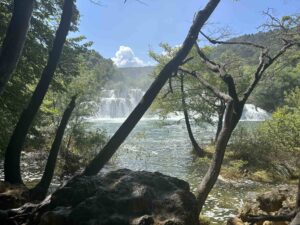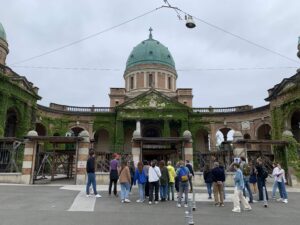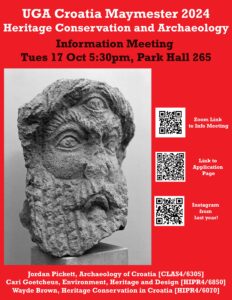After sniffing and scratching at the ground, the curious dog finally unearthed a small treasure. There it was—just beneath the ground’s surface, an irregular-shaped object with a slightly strong odor. It was a truffle found deep in the woods of Istria, Croatia.
Truffles are part of the fungi family and are used to add unique flavor to a variety of dishes. They can be found worldwide, but the Mediterranean region of Europe is especially known for harvesting them in the wild.
Truffle hunting is an activity that’s often a highlight of the Croatia Study Away Maymester, a program that has been beloved by faculty at the University of Georgia College of Environment and Design for over a decade. The program immerses students in the rich history and culture of Croatia, a small country in southeastern Europe with a population slightly less than the size of Metro Atlanta.
“Collecting truffles was truly an incredible experience,” said third-year Master of Landscape Architecture student Olivia Rothstein. “We got to see firsthand how the dogs find the truffles, dig them up, and how the hunters then collect them.”
Rothstein was also impressed by how active the Maymester was. She and her classmates were constantly on the move, she said.
“Even if we were staying at a hotel in one city, say Zagreb, we would still take day trips and excursions all over the country, which was incredible. We saw and did so much in a relatively short amount of time and it had a lifelong impact on me,” she said.

Students also enjoyed exploring Krka National Park in southern Croatia, which is famous for its beautiful waterfalls.
“I think the students really enjoy some of the more physically active places,” said CED associate professor Wayde Brown.
Brown has been with the Maymester program since 2019, and his favorite part has been witnessing students experience their first trip abroad.
“To see a group of young people, who are 19 or 20 years old begin to experience the world of travel and culture outside of America for the first time, that’s an amazing experience,” said Brown. “It makes one think about the first time you were in that situation—that first time you go somewhere foreign and the sense of wonder that you have.”
Brown teaches an introductory heritage course in the program, where students learn about cultural tourism and its impacts on society. Tourism has become a significant industry in Croatia, and Brown’s course explores the good and bad of its rise.
“Croatia is such a small country, but it has such distinct regions and all kinds of cultural influences from the Greeks and Romans to the Austro-Hungarians and Italians,” said CED professor James Reap, who served as director of the Maymester program in the early 2000s. Reap has retired from the director position but highly recommends students sign up for the program.

“One advantage of the Croatia program is that it’s relatively inexpensive compared to the others,” said Reap. “And you get to experience a lot of different things—different cultures, different regions, different geographies, different landscapes.”
Understanding a country from the perspective of its people, from its tangible and intangible heritage, is a way of learning that few people get to experience.
“This trip gave me the opportunity to learn so much from my professors in ways that are basically impossible in a classroom setting,” said Rothstein. It is a different experience to learn about cultural heritage and landscape architecture in such an immersive atmosphere, and it enhanced my knowledge while giving me the chance to learn more about my professors.”

For more information on the next Croatia Maymester, join us for an information session!
Info Session Details:
Tuesday, October 17, 5:30pm, 265 Park Hall

